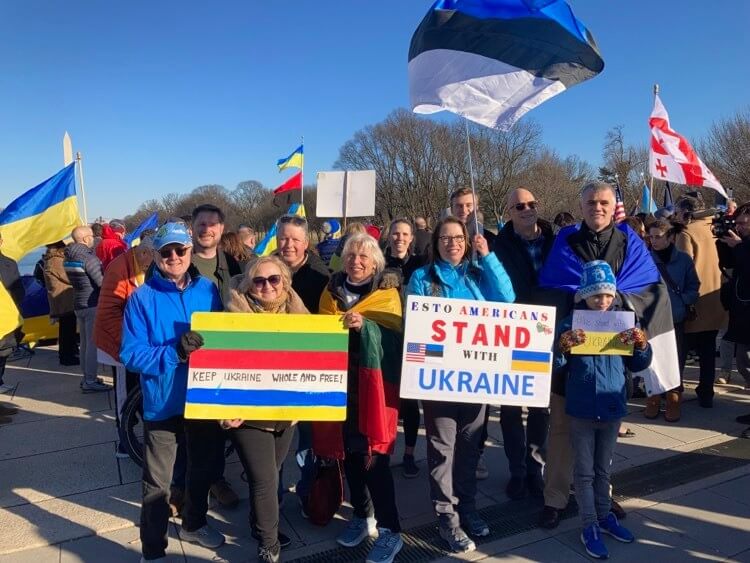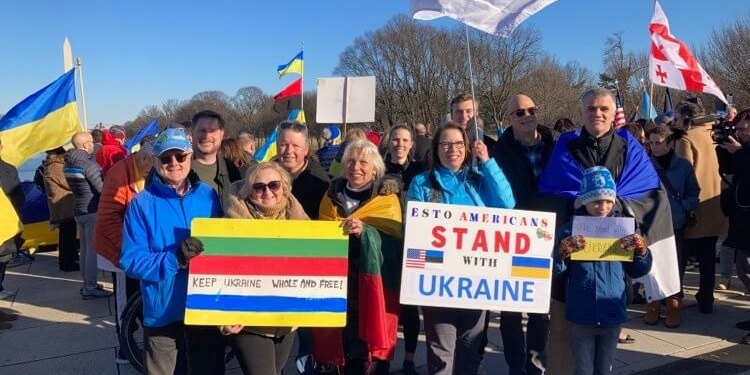While the situation in Ukraine, the security situation along NATO’s borders with Russia, and aid offered to the Ukrainian government by Estonia, the United States, and other nations continue to change on a daily basis, the Estonian American National Council is doing its best to track the major developments relevant to Estonia. EANC is also engaging in advocacy for U.S. support to Ukrainian and Estonian security, showing up at events to amplify the messages its Ukrainian colleagues are promoting against the Kremlin’s actions, and inviting Estonian Americans to do the same in their local communities.
In terms of military forces and hardware, Estonia announced last month that it would send a portion of its Javelin anti-armor missile inventory to Ukraine, while Latvia and Lithuania will send Stinger anti-aircraft missiles. EANC has held meetings with relevant Congressional offices to make sure they’re aware of the contributions by the Baltic nations and to request increases to Baltic security funding before it is finalized in the omnibus Defense Appropriations bill, to allow the three nations to rebuild their weapons stocks. The bill is expected to pass by mid-March and our constituents are also urged to contact Congress to call for increases in U.S. support to Baltic security.
Baltic security did get a boost on February 22 during President Biden’s update on Russia and Ukraine. He announced that he had authorized the “additional movement of forces and equipment already stationed in Europe to strengthen our Baltic allies.” Reuters later reported that the movement would include 800 infantry troops and up to eight F-35 fighter jets to locations along NATO’s eastern borders and 32 Apache attack helicopters to the Baltic region and Poland (reuters.com for 2/22/2022)

Foreign Minster Eva-Maria Liimets visited Washington, DC, on February 16 and 17 to speak with her counterpart and Members of Congress about Estonia’s and Ukraine’s security. She met with Secretary of State Antony Blinken on February 16 and Senators Jeanne Shaheen (D-NH), Roger Wicker (R-MS), and Chris Murphy (D-CT) on February 17. She was featured in a fireside chat with the Center for a New American Security on February 16 (https://www.cnas.org/events for February 16), where topics discussed included the importance of continued U.S. leadership in the West’s response to the situation, the difficulties of assessing the mindset of Russian citizens, regional cooperation with Nordic and Baltic neighbors, and the continued desire of Estonia for a more robust U.S. presence in the region, among other issues.
In recent weeks, several Estonian officials have spoken out in support of Ukraine’s sovereignty in the U.S. media, in think tank events, and in person with U.S. officials. Prime Minister Kaja Kallas, Foreign Minister Liimets, Riigikogu Foreign Affairs Commit-tee member Eerik Niiles-Kross, and former President Toomas Hendrik Ilves are among the notable Estonians who have been interviewed by U.S. news outlets or taken part in panel discussions on their perspectives as the situation in Ukraine has evolved. On March 1, the Center for European Policy Analysis will host the Ambassadors of Estonia, Latvia, and Lithuania to the U.S. for a discussion on “How the Baltic States Are Supporting Ukraine”.
Registration is at cepa.org/event/how-the-baltic-states-are-supporting-ukraine.
It should be clear that the messages shared by Estonian government representatives were consistently in support of Ukraine’s sovereignty and called out the Kremlin’s ill-founded basis for asserting its claims to authority over the nation. The situation is changing daily and this is just a snapshot of some of the highlights as of February 22. EANC will continue to monitor the news and developments and report items of interest.
Karin Shuey
Washington, DC Director
Estonian American National Council
www.estosite.org















